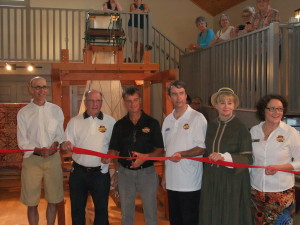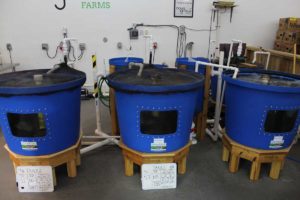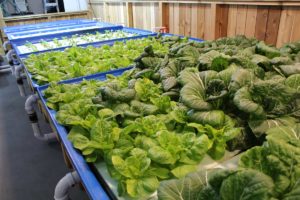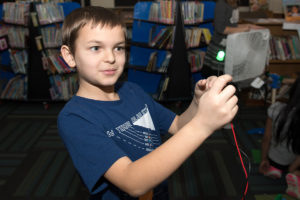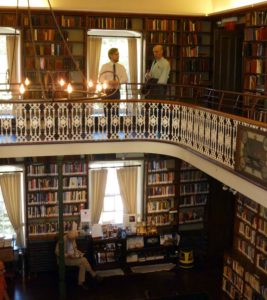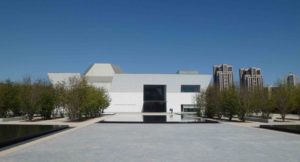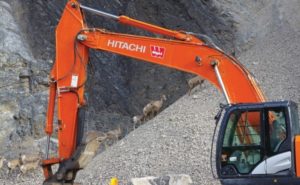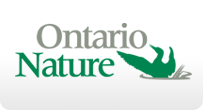Term 2 of the Branching Out program is underway at the High Park Nature Centre. It’s a program to train hike leaders in languages other than English, and participants last Saturday were planning to lead nature hikes in Russian, Arabic, Murati, French, Korean, Spanish and Mandarin. Saturday’s class was on birding, and everyone shared stories of important birds from their cultures. We’re very happy to support the High Park Nature Centre in this innovative and inclusive community-based program.
All posts by jim o'reilly
Mississauga Food Bank / AquaGrow Farms
During the Open House last week, I visited the Mississauga Food Bank facility and got a tour of the fish/farm operation in the building.
There are big tanks of rapidly growing fish, and the waste water from the fish goes through a bacterial digestion process and then nourishes the lettuce/bok choy crop right beside the tanks.
After the plants draw all the nutrients out of the water, it’s back to the fish! And the cycle continues until the lettuce and the fish are harvested for the food bank. 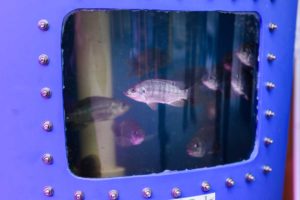
It’s important that people see new technology like this which can give local communities some food security. We’ve given a grant to the MFB for their 2019 public education program and we hope that this is a jumping off point for more groups to expand this initiative.
Exeko’s Biblio-Libre in Montreal
Exeko has run micro-library and writing programs in Montreal for residents in many of the city’s shelters, and for the homeless, with an emphasis on developing social inclusion through exchange and reflection around literature. In 2017, our foundation helped with a new workshop series based on reflection and writing on topics in selected texts. Under the leadership of Exeko’s facilitators, 17 participants of Auberge Madeleine and Chez Doris met weekly and created an exciting collection of their writing. Exeko works very carefully with its community partners to select topics of relevance and importance to the participants, and use their creativity to create greater social engagement.
Based on the excellent results this year, some public library branches will be helping with book supply and delivery and with the facilitation next year.
Relay Education’s Renewable Energy Pilot: Alberta
With the help of The Chawkers Foundation, Relay Education recently completed a year-long pilot project in Alberta. Relay is Canada’s premier renewable energy education group and runs (among many other things) hands-on school programs in primary and secondary classes (like Plug in the Sun, Renewable Design Challenge, and Green Collar Careers). This last year, Relay was able to start school programs in Calgary, Edmonton and Treaty 7 communities in which students designed and built a solar phone charger. And they kept the charger at the end!
Their success has led them to a big expansion for next year in Edmonton, and further pilots planned for Saskatoon and Vancouver.
Literary and Historical Society of Quebec
Last week, I visited Barry McCullough, at the Morrin Centre in Quebec City, where The Literary and Historical Society of Quebec runs ImagiNation, a writers’ festival for students, every April. Next year, the plan is to expand the program right into schools, and run it throughout the school year to meet the increasing demand from teachers for high-quality cultural experiences that inspire students. Chawkers will be helping with this program, which will make the Morrin Centre a focal point of the educational and cultural network of Quebec City.
Business in the Streets: Pitch Night
There was a great event last night that I dropped in on: the young Boot Camp grads at Business in the Streets held their Pitch Night for funding. It was supported by Alterna Savings and the Meighen Foundation as well, and held at George Brown College in Toronto. Grads presented their business models and plans for the future to the panel of judges, and it must have been hard to chose a final winner – they were all experienced and hard-working young entrepreneurs with solid visions for the next steps for their businesses. Past winners came back to judge, as well as members of of the business community. We supported Business in the Streets last year with a grant for continuing to update their curriculum.
Finding Home, at the Aga Khan Museum
On Monday, December 12, I went to the reception for 240 high school students from Greenwood Secondary School and Marc Garneau Collegiate, at the Aga Khan Museum. The students have been creating works of art, at the museum, that personally reflect the theme of Finding Home. The pieces of art are very powerful and evocative sculptures of how they each define “home” in this part of their lives defined by transition.
This art project is part of the Aga Khan Museum’s outreach and education program with Toronto schools, that we have been able to support, and a wonderful benefit will be welcoming the families of the students in the coming months to see their work in the amazing setting of the museum.
To find out more about the school outreach program at the Aga Khna Museum, click here.
Yellowstone to Yukon: Highway 3
Last week, I had a chance to drop in to the new office of Yellowstone to Yukon (Y2Y) in Canmore, Alberta, and have a coffee with Jennifer Hoffman and Stephen Legault. We’ve supported their work in land-use planning, and in wildlife corridor development, and we had a chance to talk about the recently completed work on Highway 3 in southern Alberta. Wildlife mortality was tracked with a new app that was used by land-owners, highway maintenance workers and local volunteers to identify the precise locations for wildlife underpasses. As you can see from the photo of the underpass construction, the big horn sheep are ever-present at the Crows Nest Lakes site, and this project is already a huge success story.
The strength of this work is the network of commitment that was established with all the community partners: the Ministry of Transportation, the highway maintenance company (Volker Stevin), the municipality, environmental groups and landowners.
For more information on making Highway 3 wildlife-friendly, and on Y2Y, here’s the link.
Ontario Nature Youth Council Weekend
On Saturday, we had a chance to visit the Ontario Nature Youth Leadership Summit where about 40 motivated, articulate young people from all over the province shared a weekend of leadership training and campaign planning.
When asked if their respective high schools had environment clubs, many youth said that they did not. That only underlined the need for ON’s Youth Council, which was started in 2010, in giving young people a way to be involved and transformative on environmental issues. The outcome of the weekend (at the YMCA Cedar Glen camp) will be the choice of a priority issue for the Youth Council work in the coming year. The leadership group will stay in touch by conference calls every month to continue to plan events and campaigns throughout the year. The next youth event is the Summit in September.
For more information on the Youth Leadership program at ON, here’s the link.
Jacquard Looms at Lang Pioneer Village Museum
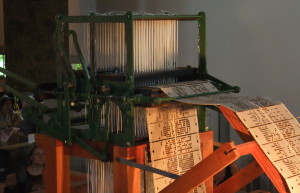
On Saturday, two of our directors had a chance to visit one of our old projects: the Replica Jacquard Loom at Lang Pioneer Village Museum, south-east of Peterborough. In 2002 and in 2011, we funded the re-building of Jacquard looms that were used in the Peterborough area in the 1880’s by Samuel Lowry. In the 1900’s they fell into disrepair, came close to being destroyed, and were bought for $10 in 1956, by Mrs. Dini Moes. She in turn donated what was left of them to LPVM in 1973. Incredibly, at the time the re-build project started, there were only 5 Jacquard looms in North America and Lang Pioneer Village Museum had 2 of them! Fortuitously, there was an expert weaver and cabinetmaker, Didier Schvartz, in the community, who committed his skill and hundreds of hours to the project.
What started as the rebuilding of the looms has grown onto the Samuel Lowry Interpretive Centre for weaving, the Festival of Textiles and ongoing Master Classes in fabric arts and technology. Many groups and dozens of people contributed to this program, both financially and with huge amounts of volunteer time, and we are proud to have been a small part of it.
